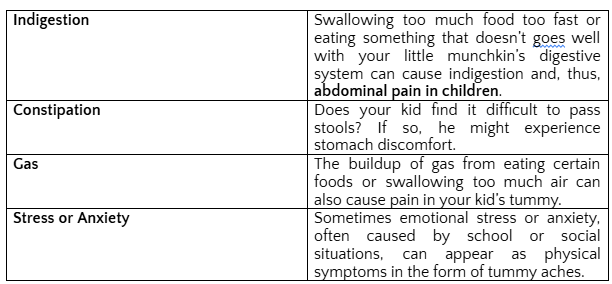When Your Child’s ‘Normal’ Tummy Ache Could Be a Sign of Something More Serious?

You can hear your children often complaining about their tummy ache. Hearing your younger ones complain, you might wonder if it’s just a common issue or something that needs more attention.
Most of the time, these stomach pains are harmless and can be caused by mere indigestion or constipation. But what happens when these complaints become frequent or more intense? Can it be because of any serious medical complication? Did they snuck a few extra snacks, or are they suffering from appendicitis? You will not know until you are aware of the common and more severe causes of stomach pains in kids.
In this article, you will learn the causes of stomach aches in little ones and when they could be signs of something more serious.
What Can Normally Cause Stomach Aches in Children?
Any parent will know that a young child tends to get stomach aches more often. But most of their tummy aches are harmless and can be treated easily. Some common causes of stomach pain in children include:

The causes of stomach pain in children listed in the above section are typically mild and can often resolve spontaneously within a short time. However, this isn’t always the case. Some tummy aches are not so simple and can potentially point to something more serious.
Is your child suffering from stomach pain for more days than they normally do, or it’s accompanied by other symptoms? In that case, you should consider the possibility of a more serious condition. Let’s take a look at a few medical conditions that might appear as common abdominal aches but need closer medical attention:
Appendicitis
Appendicitis is a condition where your kids’ appendix becomes inflamed, and it can even burst if you don’t get them treated promptly. While your child might at first experience a dull pain around his belly button, the pain typically shifts to the abdomen’s lower right side and becomes more severe over time.
Symptoms to watch for:
- Fever
- Sharp or worsening abdominal pain in children
- Nausea and vomiting
- Lack of appetite
- Inability to pass gas
Urinary Tract Infections (UTIs)
Many assume that urinary tract infections only affect adults. But it’s not true. Young children can also develop these infections, causing tummy ache, particularly in the lower abdomen, along with urinary symptoms.
Symptoms to watch for:
- Pain or burning during urination
- Lower abdominal or back pain
- Frequent need to urinate
- Fever
- Foul-smelling or cloudy urine
Gastroenteritis
Gastroenteritis or stomach flu is a viral or bacterial infection that can cause your child’s stomach and intestines to become inflamed. Usually, gastroenteritis resolves within a few days. But if your child still complains about stomach aches or dry mouth, you should visit your doctor.
Symptoms to watch for:
- Diarrhoea, vomiting
- Abdominal cramps
- Fever
- Fatigue
- Dehydration (dry mouth, lack of tears, or reduced urine output)
Inflammatory Bowel Disease (IBD)
Now that it’s rare for kids aged less than 6 years to have inflammatory bowel disease (IBD), you might not think of your child having it even after their constant stomach ache. But it always helps to be cautious and get your child checked, as IBD can cause chronic inflammation of the digestive tract.
Symptoms to watch for:
- Chronic abdominal pain, often around the lower abdomen or belly button
- Blood in stool
- Fatigue
- Weight loss
- Diarrhoea
Pancreatitis
Sometimes, your kid experiencing pain in stomach can also indicate a problem with his pancreas. It’s possible he has pancreatitis, which is characterised by inflammation of the pancreas mainly due to gallstone complications.
Symptoms to watch for:
Indigestion
Pain in the abdomen or back
Nausea
Vomiting
Intestinal Obstruction
Intestinal obstruction happens when the food or liquid your child consumes fails to pass through their small or large intestine because of a blockage. Although it’s rare for children to have such a medical problem, there could be a possibility if they experience severe abdominal pain, constipation, or vomiting.
Symptoms to watch for:
- Severe abdominal pain that comes and goes
- Swollen or bloated belly
- Vomiting
- Constipation or inability to pass gas
When to go to the Emergency Room?
If your kid experiences any of the following mentioned symptoms with pain in stomach, you should take him immediately to the emergency room:
- Your kid is suffering from a stomach ache longer than 24-48 hours, and it’s becoming progressively worse.
- The pain is localised to one area of the abdomen. For instance, pain in the abdomen’s lower right side could indicate appendicitis.
- Stomach pain is accompanied by symptoms like fever, vomiting or diarrhoea.
- When your kid vomits blood, or there is blood in the stool.
- Your little one is unusually irritable, lethargic, or weak.
- When you notice the signs of dehydration, such as dry mouth, sunken eyes, or reduced urine output.
- Your child has hives, complains of dizziness, has a swollen face, or looks pale.
To sum up it all!
A few days back, did your child have a stomach ache and still haven't gotten better? In such a case, you shouldn’t ignore their stomach pain as your little one may be suffering from any underlying severe ailment. As a precaution, it’s advisable to maintain a diary of your child’s stomach aches. You can note the details like what your kid ate, how they acted, weird symptoms, what their stool looks like, etc. This information can help the paediatric gastroenterologist at Medanta determine the cause of your little one’s stomach ache.


